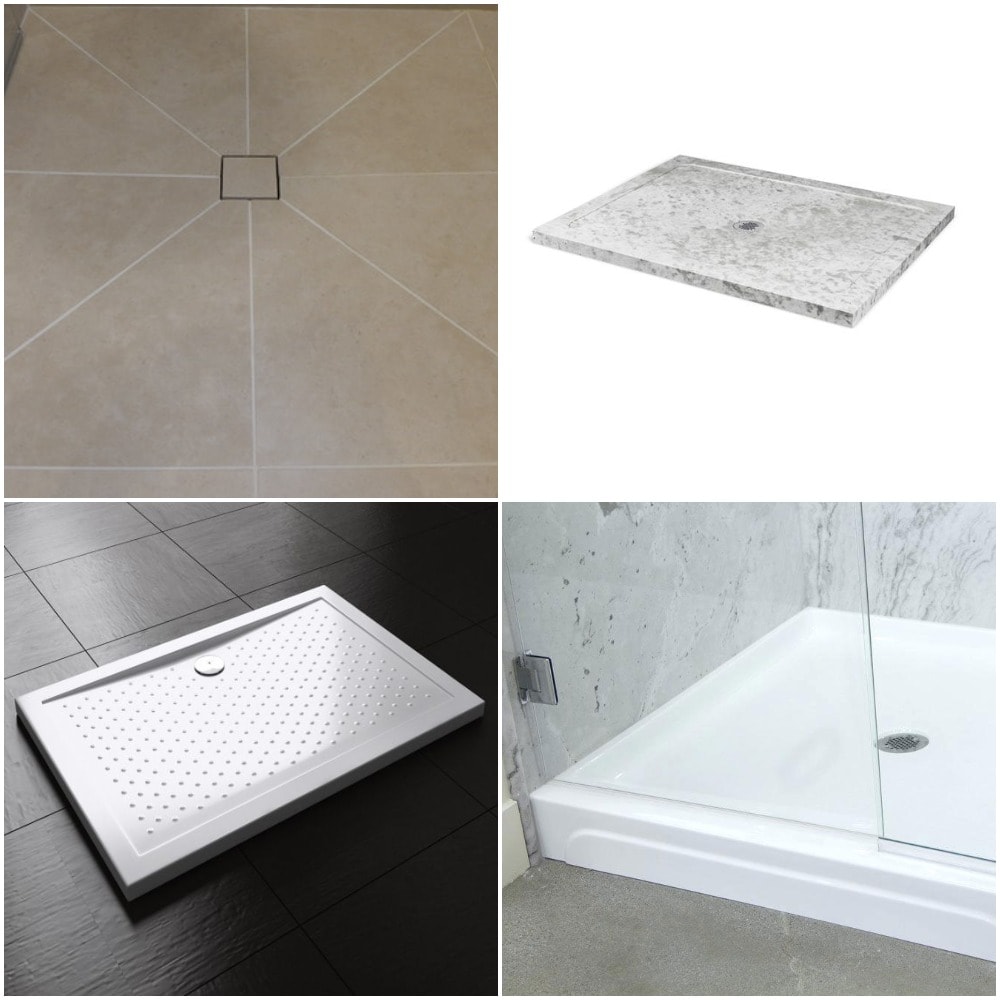A Comparison of Types of Shower Base Materials
Though most of you probably just call the bottom of your shower a floor, you might see this essential component referred to as a shower base, pan, or even receptacle. Whatever you call it, the shower base serves as the foundation for your shower and ensures water falls into the drain and not into your basement or floorboards.
Before you choose, you’ll want to consider ease of maintenance, durability, and cost. Take a minute to learn some vital information to help you make this important decision.
4 of the Best Shower Base Flooring Options
You can choose between a variety of high-quality options, so your own best choice may depend upon your budget and preferences.
1. Tile Shower Bases
You may decide that you want to tile the floor of your shower to match the walls or bathroom floor tile. This is generally a high end shower pan solution because of the cost and maintenance. Since people taking a shower will stand on wet tile, you may also want to consider the texture of the surface to ensure it’s not a slipping hazard.
For tile, you have a couple of options:
- Tileable Shower Base System: You can purchase a tile ready floor pan. These may come with chrome drains and are usually made of fiberglass and/or composite plastic materials. They should have been designed to make the drain easy to connect with plumbing. Kits may come with a waterproof epoxy that will adhere to tiles and the bottom and sides of the pan. These systems generally start in the $500s, and that doesn’t include tiles or installation.
- Tile over concrete: As with a more traditional tile installation, you may install tile over concrete. Since neither tile or grout may be waterproof, you will generally need to use a waterproof material to set the tiles and again, to coat them. Of course, this task also requires setting the drain in place and connecting it to plumbing. This solution can benefit you with total control over the customization of appearance, size, and shape. The cost may vary because of materials chosen and the size and complexity of the shower floor, but it’s likely to be a more expensive option than using pre-made shower pans because of labor involved.
Some coatings can help protect grout, but in a high-use area like a shower, it’s more likely to stain and require a lot of maintenance. If possible, tiling without grout may offer a better solution.
2. Molded Stone Shower Bases
Molded stone shower pans can offer you another high-end and elegant solution. They’re usually made of a natural stone and synthetic plastic for a combination of durability and a luxurious appearance. High-quality molded stone should be easy to keep clean and resistant to such threats as mold and mildew. They also don’t require grout, which can become a cleaning issue. Not including accessories or labor, molded stone shower floors generally start around $800. On the other hand, you don’t need to pay for tiles or spend time setting them.

The 4 best shower flooring options: Tile (top left); Molded Stone (top right); Acrylic (bottom left); Fiberglass (bottom right).
3. Acrylic Shower Pans
Acrylic shower pans can offer you a medium-priced solution that affords you some ability to customize the look and feel of your shower floor. Acrylic systems come in a variety of colors and sizes, though white, grey, and black are common options. You can also order custom pans to fit in non-standard spaces or match specific colors. Expect the price of smaller acrylic shower pans to start in the $300s, not including labor and accessories. Starting at closer to $900 for the system, you can even buy acrylic shower pans with molded shower seats.
Some benefits of acrylic shower bases include easy cleaning and maintenance and a relatively modest cost. Since they come in one piece, they’re not as likely to crack as tile.
4. Fiberglass Shower Pans
It’s possible to find off-the-shelf fiberglass shower pans for less than $200. This price makes them a tempting alternative for some uses. However, cheap fiberglass tends to stain quickly, so they’re not likely to give you long-term satisfaction. Even if you take care to clean your shower, mineral deposits from water may build up over time.
Since it can take an abrasive material to remove these mineral deposits, cleaning them with abrasive materials can risk scratching the fiberglass. You can clean them with some acidic chemicals, but if you’d rather avoid using these in your home, you might consider an acrylic shower pan instead. You can find some more expensive fiberglass and composite shower pans that reduce the chance of staining, but by then, the price range will be similar to acrylic or tileable shower pans anyway.
Which Shower Base Should You Choose?
No matter which type of shower base you choose, remember that this part of your shower serves vital functions. Mostly, it keeps water draining into your plumbing and not dripping through your floorboards or into your basement. Problems with shower pans or their installation can lead to warping, mold, mildew, and other expensive damage. Also, you will want to make certain that you have a secure surface to stand upon.
While you might have the chance to trim your budget on other parts of a bathroom renovation, you should not skimp on your shower floor.
For example, you might decide upon a cheap shower pan made of fiberglass if you just need to fix a shower in a home you intend to sell relatively quickly for a modest price. If you want to keep your home for years and to add value in case you do want to sell, you’ll probably find that a more durable solution will save you time or money in the long run. Acrylic shower pans can provide you with a moderately priced and customizable solution that’s pretty easy to maintain. For a more luxurious appearance and to match other parts of your shower and bathroom, you may want to consider molded stone or tile.
Article reviewed by Dan Bawden, CAPS, GMB, CGR, CGP, and President of Legal Eagle Contractors.






